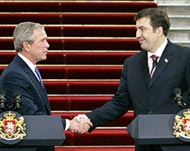Russia-Georgia ties deteriorate
As tensions rise between the two neighbours, a row over a Moscow-backed autonomous region on Georgian territory could lead to open conflict.

Since its “rose revolution” which deposed President Eduard Shevardnadze and ushered in a pro-western government in 2003, Georgia has moved away from its image as an obscure post-Soviet republic.
Hoping to strengthen relations with the West, Georgia removed visa requirements for EU and US citizens visiting the country.
US troops currently help train the Georgian army and the country has played a key role in the creation of a so-called energy corridor between Central Asia and Europe by facilitating the construction of pipelines on its territory.
But as the country moved closer to the West, its ties with Russia, who sees its southern neighbour as the centre of its sphere of influence in the south Caucuses region, have soured to the point of open hostility.
“Russian-Georgian relations are bad … Sometimes they are just bad, sometimes very bad and sometimes even worse,” Alexander Rondeli, the president of the Georgian Foundation for Strategic and International Studies, told Aljazeera.net.
Latest crisis
The latest crisis began with Georgian President Mikhail Saakashvili’s accusation that Moscow was responsible for blowing up gas pipelines in southern Russia and starving Georgia of energy supplies for several days in January.
Georgia borders Russia in the north, and Turkey, Armenia, and Azerbaijan to the south |
Now the row has shifted to the status of South Ossetia, one of two Moscow-backed autonomous republics (the other is Abkhazia) on Georgian territory.
Georgia fought wars with both states in the early 1990s leaving thousands dead and creating more than 300,000 refugees.
Georgians believe Moscow uses these mini-republics as a means to control its southern neighbour, and without Russian military support, both regions would cease to be autonomous.
War of words
A decision by the Georgian parliament that Russian peacekeeping forces must withdraw from South Ossetia on 15 February intensified the war of words and sparked fears of renewed conflict.
A Kremlin adviser implied that the solution to the crisis was to assassinate a leading figure in the Georgian government – possibly Saakashvili himself.
“The cost of a single bullet being lower than the cost of war,” Gleb Pavlovsky said on Russian TV on 18 February.
For his part, the South Ossetian defence minister Anatoly Barankevich said: “If Russian peacekeepers are withdrawn, we will do everything we can to withstand the aggression of the Georgian armed forces.”
Presence in the Caucuses
“Russia wants to stay in the Caucuses, and if Russia wants to stay in the Caucuses it must stay in Georgia because Georgia is the key to the Caucuses,” said Rondeli.
“Russians will defend South Ossetia and Abkhazia for themselves. They will not let us take them back,” he added.
|
Georgia declared independence from the crumbling Soviet Union in 1991 but was rocked by military coups in the early 1990s. Eduard Shevardnadze became president in 1995 ushering in relative stability.
During this period, the Georgian territories of South Ossetia and Abkhazia were led by separatists who enlisted Russian military assistance and became autonomous.
With several thousands killed in the ensuing conflict, Georgia accused South Ossetia of ethnic cleansing. |
Russia, however, accuses Georgia of using the issue to deflect attention from domestic shortcomings.
“If anybody thinks that these kinds of problems can be resolved simply by deflecting the population’s attention to search for foreign enemies, I suggest that this is the wrong path,” Russian President Vladimir Putin recently told reporters.
The spat has also resulted in other tit-for-tat measures.
The Russian embassy in Tbilisi has stopped issuing Georgians with Russian visas. Georgians are the only nationals from the former-Soviet states who had required Russian visas.
Residents in Abkhazia and South Ossetia do not require such documents.
The Georgian government is exasperated at Russian policy and argues that Tbilisi could protect Moscow‘s interests in the region if it were allowed to.
Cultural links
Diplomatic relations aside, Russia is Georgia‘s main economic partner and leading foreign investor, and economic ties between the two countries have been improving.
Many Georgians live and work in Russia and the cultural links remain strong.
Combined with this is the role Georgia has played in securing the border with Chechnya and Russia‘s other rebellious northern Caucuses states.
“We share many interests,” Deputy Georgian Foreign Minister Valeri Chechelashvili said.
“We can import security and stability to each other or insecurity and instability … We have a lot to offer,” he told Aljazeera.net.
But Georgians argue that under the rule of President Vladimir Putin, Russia has been regaining lost confidence and is now eager to reassert itself in its former satellites.
In this situation Georgians say they have little choice but to seek support from the west if they wish to maintain independence.
Pro-US?
 |
|
Bush (L) visit to Tbilisi was proof |
US President George Bush’s visit to Tbilisi in May 2005 was proof of the pro-US mood and warming relations with the West.
It remains unclear how much further Georgia is willing to go in moving away from Russia and closer to the EU and US. Tbilisi wants to join NATO and there are even reports that the US has inquired whether Georgia would allow its territory to be used in a possible strike on Iran.
However, many are concerned that as a small state in a complex region Georgia must try to maintain some neutrality. After the pipeline explosions in Russia, Iran offered to supply gas to Georgia suggesting that too much involvement with the US might not be a good thing.
“If it were not for the Americans, Georgia would not exist as an independent state,” Rondelli said.
“It’s a big game in which we are a very small state, we are thankful to the Americans but we understand that they will not start a third world war because of Georgia.”